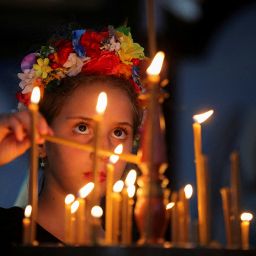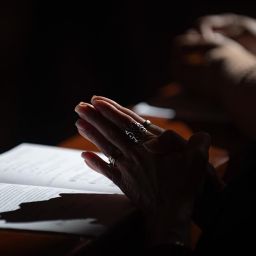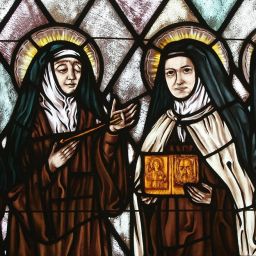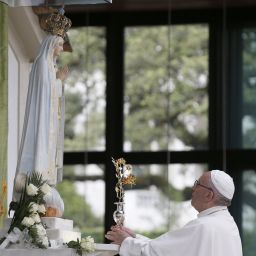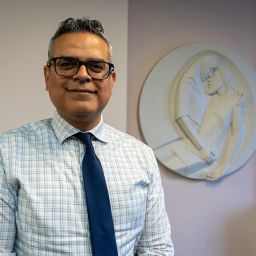By Amy White
The Texas Catholic
Over the past year, St. Elizabeth Ann Seton Catholic Church in Plano has seen significant — and unprecedented — growth in the parish’s Order of Christian Initiation of Adults. The growth has been “sudden,” according to Director of Faith Formation Bruce Baumann, who said that the program had essentially tripled its number of participants from the year before.
Currently, the class has about 40 catechumens and candidates combined, compared to the 12 to 16 average seen in prior years, OCIA catechist leader Deacon Vince Vaillancourt said; and based on the number of inquiries received to date, he projects that the parish will see a similarly large group next year.
As the program experiences this dramatic inflow of participants, members of the parish’s OCIA leadership, as well as a few of the catechumens and candidates themselves, have offered their insights about why this increase in participation is happening now.
House of God
As inquiries about exploring Catholicism reach St. Elizabeth Ann Seton, Baumann quickly schedules one-on-one conversations with those who have called so that he can learn about their interest in the faith and connect them with resources. Through these initial conversations, he has uncovered some of the common reasons people are entering the OCIA process at St. Elizabeth Ann Seton — including one that is unique to the Plano parish: the church building itself.
Near the end of 2023, St. Elizabeth Ann Seton unveiled its new house of worship. The edifice loomed large: a towering, Neo-Romanesque structure featuring large bronze doors and Italian stained-glass windows. To some of the passersby who spotted the structure, the building was like a beacon calling them home to the Church.
“I had so many people just randomly reaching out to me saying, ‘I’ve watched the new building go up, and I’ve been thinking about this for a long time, and I want to learn more about Catholicism,’” Baumann said. “It just drew them in — like maybe that was the clincher for them.”
That was the case for Rose Lykins, a current candidate in the Plano parish’s OCIA process. When Lykins moved from Ohio to Texas in 2022, the new church building was still under construction; a wire fence skirted the exterior of the incomplete structure. Even so, the beauty of the place fascinated her.
“I was drawn to it in a way I don’t think I’ve ever been drawn to a building before,” Lykins said. At the time, Lykins, a Baptist, was in frequent conversation about the faith with her youngest son, a Catholic convert. The pull that she felt from the church building — along with the conversations she had with her son — was enough to bring her into the new church to experience the Catholic Mass for herself. “I had always sworn that I would never step foot in the Catholic Church, but when I came in, I felt the reverence and the quiet.”
Moved by the experience, Lykins joined the OCIA process.
A young church
As compared to past years, the age of this year’s SEAS OCIA group skews young. More than half of the participants this year are under 30 years old; three are fresh out of high school, and several others are single and in their 20s. Leaders of St. Elizabeth Ann Seton’s OCIA suggested that this increase in interest in Catholicism among young adults is responsible for some of the growth seen in the program.
“It’s very joyful, and it’s very encouraging,” SEAS pastor Father Bruce Bradley said. “They’re looking for truth in their lives and looking for meaning in their lives.”
Ian Miller, 19, said he decided to join the OCIA program at SEAS after an impactful moment in eucharistic adoration at the Dallas Catholic Youth Conference, an annual event hosted by the office of Youth, Young Adult, and Campus Ministries in the Diocese of Dallas. Raised in a family without a shared faith, he said he found the sense of meaning he craved through his encounter with the Catholic Church.
“Every single class,” he said of the OCIA program, “my heart yearns for more and more.”
Another young adult, Ella Raebel, 21, said that she was drawn to the sense of peace the faith offers. Inspired by a desire to “find something more” than herself, she attended a few Masses with her father and noticed the serenity and confidence that his relationship with God brought him.
“I was searching for that kind of peace too,” she said. “Being a young adult — I’m in nursing school now — I just view my future as very unknown right now; but the stability of something like this community, and God having my back… It’s made my life so much better.”
Raebel said the community that she has found through OCIA has been unlike any other that she has experienced. Her OCIA sponsor, who Raebel jokingly calls her “adopted grandma,” has been an especially dear relationship in the parish.
“I never really knew what it was to be a child of God until I found this community,” she said. “They’re so kind, so welcoming, and it’s almost like they take you in as your family.”
Online evangelization
Easy access to faith education through a bevy of online Catholic resources — from Ascension Press to Word on Fire — also appears to be responsible for some of the OCIA process’ growth. For several of the catechumens and candidates, an early step in their conversion story was their own personal online research into Catholicism. As a result, many of the members of this year’s OCIA have proved to be more knowledgeable of the Catholic faith than sessions in past years, Deacon Norm Smith, who helps lead the program, said.
“They have already gone and found the great Catholic resources that are online now,” the deacon explained. “They spoke about seeing things from various resources online… and just taking advantage of those resources.”
Cassandra Quintana, an OCIA elect, said that her journey to the Catholic Church started with a Google search. Raised non-denominational, Quintana wanted to learn more about various religions and used the internet to research them, eventually leading to a “deep dive” into Catholicism.
“When I read about the Catholic faith, there was just something so peaceful about it. I didn’t understand a whole bunch of what I was reading, but there was just something about it that was calling out to me,” she said. As she began pursuing the faith offline — attending Masses and integrating into the SEAS community — she continued to pursue it online as well, looking to Catholic resources to answer her questions.
“They’re searching for something more important than just the latest trend, the latest goofy thing on whatever social media app they use,” Deacon Smith said, “and so those people are finding that information and being drawn, I think, to the solid reality and the truth of the Catholic Church.”
As a former non-denominational Protestant, Quintana also represents another increasingly represented group in SEAS OCIA: Members who are coming to the process from other faith traditions.
“Coming to the Catholic faith is literally the definition of the fullness of faith; and it is so rich, and it is so alive,” she said. “I am nothing but thrilled to be joining this community.”
A wider trend
St. Elizabeth Ann Seton is not alone in the growth of its OCIA process. Several parishes in the Diocese of Dallas have experienced a similar boost in participant numbers over the past year.
Della Doss, OCIA & family life coordinator at St. Jude Catholic Church in Allen, said that the parish’s OCIA process has almost doubled from last year. A year ago, the program had about 40 adults; now it has about 70. The class has grown so much, Doss joked, that she has “to figure out where everyone is going to be seated” at the Easter Vigil.
St. Joseph Catholic Church in Richardson also noted a significant growth in its adult formation program.
“Right now, I’m getting almost a person a week… contacting us about either coming into the Church or completing their sacraments,” Deacon Richard Nelson, who has assisted with OCIA for about four years, said. Currently, the Richardson parish has about 35 people in its process.
Like SEAS, these parishes have noticed similar trends: an increase in young adults and in converts from Protestantism, as well as a notable number of catechumens and candidates who come into the program well-read about the faith.
“They start looking into OCIA,” Doss said, “and it all comes together.”
Cutline for featured image: Catechumens and candidates in the Order of Christian Initiation of Adults at St. Elizabeth Ann Seton Catholic Church in Plano attend an OCIA meeting in the SEAS Parish Hall on March 12. (AMY WHITE/The Texas Catholic)






